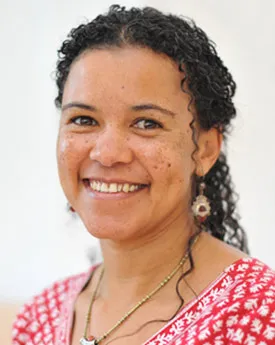In this lecture, Dr. Christina Hicks discusses political ecology and argues that while this discipline draws on many theories, it is more aptly described as a method rather than a theory. This is due to how political ecology influences the lens through which one views a system and subsequently the related questions one asks. She explains that political ecology reveals why socio-political and power issues shape ideas, actions, and our interpretation of the world.
She illustrates this notion using the concept of adaptive capacity—the conditions that enable people to anticipate and respond to change, minimize the consequences, recover, and take advantage of new opportunities by building more capacity. Today, the narrative of building capacity focuses more on the role of building assets than on flexibility, organization, learning, and agency. All of these things are constrained by a range of factors such as individual identity, relationships, and social or gender norms, among others. Thus, the ability to adjust to change is much more complex than the prevailing narrative suggests. It is influenced by power in all its dimensions and across all scales. The interconnections bound what's possible and they constrain the plausible pathways that individuals and communities have available.
In this talk, she provides explicit examples using her research related to fisheries, the COVID-19 pandemic, and economic and political forces that influence human nutrition in Africa. The last part of the lecture focuses on social justice concepts such as recognition, distributive justice, and procedural justice. The culmination of which is the viewpoint that political ecology can be used to reveal underlying causes of socio-political power dynamics and thus is useful as a conduit for change.
-
About the Presenters
Image

Christina Hicks
ProfessorDr. Christina Hicks is an environmental social scientist interested in the relationships that individuals and societies form with nature; how these relationships shape people’s social, environmental, and health outcomes; and how they create sustainable livelihood choices. Christina is a professor within the Political Ecology group at Lancaster University’s Environment Centre. She gained her PhD in 2013 from James Cook University; after which, she held an Early Career Social Science Fellowship at the Center for Ocean Solutions, Stanford University. Today, she is a Professor within the Political...
Image
Christina Hicks
ProfessorDr. Christina Hicks is an environmental social scientist interested in the relationships that individuals and societies form with nature; how these relationships shape people’s social, environmental, and health outcomes; and how they create sustainable livelihood choices. Christina is a professor within the Political Ecology group at Lancaster University’s Environment Centre. She gained her PhD in 2013 from James Cook University; after which, she held an Early Career Social Science Fellowship at the Center for Ocean Solutions, Stanford University. Today, she is a Professor within the Political Ecology group at the Lancaster Environment Centre.